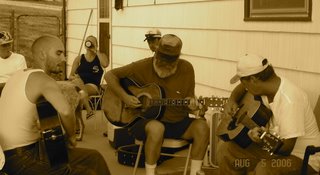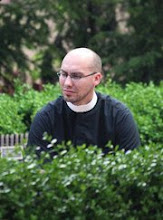THE PULPIT: to go or to follow
***
It had been a long and eventful trip so far. Jesus had turned his disciples’ attention, as well as their wanderings, toward Jerusalem. At various points along the way, Jesus had stopped their travels to tell them of his impending date with the cross. Three times he’d told them of his upcoming death and resurrection and each time they had managed to misunderstand. Last time, Jesus told them of what must happen and they all started fighting about who would be great in Jesus’ kingdom. How they were so unable to see what Jesus was telling them I don’t think we’ll ever figure out. They were so blind to what he was trying to show them. They must have all been a little frustrated. There’s no doubt, all involved were glad to get a small break from their travels. They had arrived in Jericho and probably spent at least a couple days there before setting out again on the road to the cross. This morning’s text is Mark 10:46-52. Stand with me for the reading of God’s Word.
Jesus Heals Blind Bartimaeus
Then they reached Jericho, and as Jesus and his disciples left town, a large crowd followed him. A blind beggar named Bartimaeus (son of Timaeus) was sitting beside the road. When Bartimaeus heard that Jesus of Nazareth was nearby, he began to shout, “Jesus, Son of David, have mercy on me!”
“Be quiet!” many of the people yelled at him.
But he only shouted louder, “Son of David, have mercy on me!”
When Jesus heard him, he stopped and said, “Tell him to come here.”
So they called the blind man. “Cheer up,” they said. “Come on, he’s calling you!” 50 Bartimaeus threw aside his coat, jumped up, and came to Jesus.
“What do you want me to do for you?” Jesus asked.
“My rabbi,” the blind man said, “I want to see!”
And Jesus said to him, “Go, for your faith has healed you.” Instantly the man could see, and he followed Jesus down the road.
Jesus and the twelve had wrapped up their stay in Jericho and a great crowd escorted them out of town. The large group made quite a cloud of dust as they shuffled down the dirt road past the city gates. The crowd, no doubt, also made quite a racquet as they passed the lonely beggar, each trying to brag about how Jesus bumped into them. The crowd was nearly past when Bartimaeus was able to make out one name: “Jesus.” Putting two and two together, he realized this was the one everyone was talking about. This was the Messiah.
Bart’s usual chant, “alms for the poor,” usually mumbled under his breath because no one really listened to a nobody like him was suddenly emboldened. He began to shout. “Jesus, Son of David, have mercy on me!” “Messiah, Messiah, be gracious unto me!” It was so out of character for Bart to speak up – for an outcast to talk like that to a citizen – that everyone stopped to see who had spoken out.
They turned and saw Bart. He was sitting along the wall, wrapped in a blanket. In his lap, on top of the blanket, was a small pot with a few coins jingling inside. But their attention was quickly drawn to his face, his horrific face. It was filthy and unkempt, like many who sat at the gate, but it was horribly disfigured too. His blindness was not a birth defect, but rather a disease. His eyes were extremely swollen and dark pink. So swollen infact that they were swollen shut, like two golf balls popping out of his head. They oozed with infection and flies buzzed incessantly around his head. His disease was highly contagious, which is why he was relegated to begging at the city gates. It simply wouldn’t do for him to have contact with health people. It was unacceptable for one of his uncleanness to be around the clean.
The crowd began to rebuke him. They didn’t want this man infecting their Messiah – they didn’t want this man infecting them! But Bart knew this was his one chance to meet the Messiah, so he cried out, loud as ever. “Jesus, Son of David, have mercy on me.” “Messiah, Messiah, be gracious unto me.”
Jesus stopped when he heard the cries for mercy. As the dust settled, he turned to the crowd and told them to invite Bart to the front of the pack, where Jesus stood. One brave one in the crowd stepped carefully toward Bart. “Take heart…be courageous, get up! He’s calling for you.”
Ah the sweet, sweet music to his ears. It was like the prospect of cold water after wandering through the desert for days. Bart through off his cloak, sending the coins flying through the air as the pot shattered against the wall. He quickly, well as quickly as he could, limped toward Jesus.
“What is it you want me to do for you?” Jesus asked.
Bart simply wanted some money or maybe some food, but this is the Messiah. He paused while thinking. “Do I dare ask for the impossible?” “It is the Messiah.” “What the hey,” he thought. The crowd waited with baited breath, Jesus waited as if reading his mind. “Great teacher,” he said, “I want to regain my sight!” The crowd gasped, but Jesus wasn’t surprised.
Jesus responded as if he were going to heal him all along. “Very well,” he said, “Go. Your faith has made you well.”
Immediately the puss dried up and the swelling went down. His eyes were opened and he saw the looks of amazement on the faces of the crowd, and the look of love on the face of Jesus. Jesus and the twelve started again on their journey while the crowd just stood petrified with awe. Bart looked at Jericho and thought of his family, friends, his life. Then he looked at Jesus. He’d been told to go, but he took off running, following Jesus, not wanting to be left behind.
We often look at this story and are totally amazed by Jesus. His compassion is in full view. Bartimaeus was not just a cripple; he was unclean and contagious. His disease would lead to death for anyone who got near. He was a second-class person, he was unimportant, he was a drain on society, he was worthless. In every sense of the word, Bartimaeus was a NOBODY. Yet Jesus stopped for him. Jesus was present with him. Jesus was attentive to Bart’s life.
Further, Jesus power is displayed for all to see. Bartimaeus asked for the impossible and Jesus granted it. Jesus healed his eyes so that he could see again. But Bartimaeus was not only healed physically, but the cause of his social and emotional ailment was healed as well. Having his sight back, he was no longer contagious. He could soon be declared clean. He was no longer a drain on society. With his vision, he could soon return to work as a productive member of society. He was no longer a social outcast. He could return to the city, and to his relationships with family and friends. Jesus healed Bartimaeus in a tremendous miracle.
We often get so caught up in the miracle that we miss the truly astounding part. “Jesus stood still and said, ‘Call him here.’ And they called the blind man, saying to him, ‘take heart; get up, he is calling you.’” This story contains a healing, but it is about a calling. “Take heart; get up, he is calling you.” The real miracle is that Christ calls Bartimaeus. Christ call is extended to a contagious, unclean, unimportant, unproductive, second class, worthless nobody like Bartimaeus.
And when Bartimaeus hears the call, he must respond. He “jumps to his feet” -- he pushes his way through the crowd, brushing shoulder after shoulder. When the master called, all the social stigmas didn’t matter anymore. All the things that Bartimaeus would never have brought himself to do (running, yelling, touching people!) he did to get to the Messiah. He came to Christ, and was confronted by Christ. Christ asked him about his deepest desires, and Bartimaeus responded honestly. “What I really want is to have my sight back.” Jesus calls this response faith. Bartimaeus responded openly and honestly to the call of Christ and it was called faith.
At some point in our life, we are all Bartimaeus. We’re all spiritual Bart’s, stumbling through our existence just hoping to find the next meal. We’re all spiritual Bart’s – suddenly aware that Christ is near. We’re all spiritual Bart’s – when Christ calls us to come to him. We all have to through off our cloaks, jump to our feet, and stumble to the Master, just like Bart! But the most intriguing part of the story to me is not the healing, but the ending. It doesn’t end as we might expect.
Jesus tells Bartimaeus he is healed. Jesus tells Bartimaeus to go. We would expect Bart to jump for joy, yell and scream, run and be reunited with family and friends. We would expect him to go, but he does not. What does he do? He follows. Christ and the twelve continue on the road to Jerusalem – the road to the cross – but no longer are there 12, there are 13. Bartimaeus is following, bringing up the rear.
It is not enough that we are healed. Faith is not a one-time decision to come, but a lifelong decision to follow. The truth is we are always like Bartimaeus. Who of us can really see the face of God? Who of us can see where God is going? Who of us can see where God is calling us? Every day is a new call. Every day requires a new response. We are not called only to a one-time decision, to a moment of faith after which we “become Christian” and go back to life as usual. We are called to much more than that. We are not called to just a moment of faith; We are called to live a life full of faith. We are called to be faith-full…faithful like Bartimaeus, faithful like a phoenix. To the glory of God: Father, Son, and Holy Spirit. Amen.


